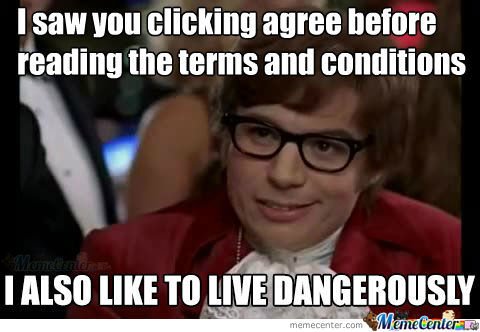
How To Write Effective Terms And Conditions
Terms and Conditions are an important part of any business, ensuring that trading arrangements are governed by well thought through contractual provisions that clarify, protect and advance commercial interests. At the very least, you should have separate terms and conditions to cover the use of your website, the relationship between you and your suppliers and the sale of your products and services.
In essence terms and conditions establish the rights and responsibilities of contracting parties, avoid misunderstandings and importantly protect your business in the event that something goes wrong. You should always make sure that you have a record of your Ts and Cs being accepted before proceeding with any transaction.
Furthermore, well drafted and coherent terms and conditions are also an important part of creating a professional and trusted impression with customers so as to help facilitate business.
Have you neglected your terms and conditions?
Unfortunately, terms and conditions often don’t get the attention they need. They either get put to the bottom of the to do list or worse still, they get scraped together by copying and pasting someone else’s. The trouble with someone else’s terms and conditions is that they may not be any good and they probably won’t reflect your business, even if they’re from a close competitor in a similar market.
Another quick fix is to buy or download a template, although the quality of these will vary and there is no one size fits all.
Terms and conditions invariably need to be unique and specific to your business. If they’re not, they will probably create the wrong impression with customers, generate confusion which negatively impacts on sales and, in the event of something going wrong, not protect the business. Careful planning and drafting can take you a long way, but even for bootstrapped startups it is almost always better to take legal advice from an experienced specialist.

How to plan your terms and conditions
Before you start drafting, you need to look at the bigger picture to gain an understanding of the whole business.
Speak to the sales team and customer services. Study the website and other materials. Get an understanding of how and where the terms and conditions will appear in the process and at what stage of the customer journey.
For example, do you frequently lose sales just before “check out” and if so, what role if any, do the terms and conditions play in this. Could they be simplified to improve things.
What common objections or questions do the sales team come across? Is there a common issue that comes up with customer service? Do your small suppliers struggle with, for example, 3-month payment terms?
Take these broader insights and combine them with the specific details of your services, product and customers as you start to plan.
What needs to be included when you write your terms and conditions
Every set of terms and conditions should be different, but generally they should:
- Start by making it quite clear that the reader must accept the terms and conditions (and any subsequent amendments to them) if they wish to proceed.
- Define what products or services will be provided.
- Set out the payment terms, including when payment is due, what happens in the event of late payment (interest etc.), non-payment or incorrect payments / billing.
- State who owns the products or services before and after payment is made.
- Set out any responsibilities of either party in respect of the good or services.
- Set out any guarantees or warranties.
- Clarify delivery terms – who is responsible for delivery and the costs / timing of delivery.
- Explain the procedure if something goes wrong or there is a complaint.
- Clarify how either party ends the relationship and what, if any, notice is required.
- State which law governs the contract and how and where any dispute will be settled.
- Provide space for the customer to sign, or tick a box, and record their agreement.
Other considerations
Certain terms and conditions will require more specific information. Businesses selling products or services to consumers through websites must comply with consumer contract and distance selling regulations. These require businesses to give consumers certain information before they enter into a contract.
So, for example, in respect of your website, you will almost certainly require:
- Minimum information to comply with e-commerce regulations. This includes providing the name of the service provider, a geographic address, an email address, details of any relevant supervisory authority if the services are subject to a regulatory scheme, a VAT number (if a business has one) and clear and unambiguous pricing, including whether prices are inclusive of VAT and delivery costs.
- If your business is a company, then the Companies Act 2006 requires you to state the place of registration on your website (e.g. “ABC Ltd is a company registered in England and Wales with company number 1234567”).
- A disclaimer in respect of the accuracy of information on the website and for any liability resulting in the use of your website, as well as details about permitted / prohibited use of the website and its content.
- Details of your intellectual property rights. You should include information about use of intellectual property, ownership, infringement and reporting infringement.
- Data and privacy details. If your business holds data belonging to your customers (contact details, credit card numbers, bank accounts and purchase history) you must put measures in place to protect you and your customers. Include this in your Ts and Cs by explaining how information will be processed, treated and protected and in what circumstances you’ll pass it on to third parties. This is an increasingly important area for consumers and business owners alike, so try to also ensure you also create the right impression. Consumers want reassurance.
- An explanation of user accounts or subscriptions and their terms, as well as how they can be terminated if abused.
- A provision notifying your users how you will handle changes to the Ts and Cs.
- A statement about how your site uses cookies. Your user should be asked if they want to accept them.
The above is not an exhaustive list. Some or all may apply to your business. If you are in any doubt its best to seek relevant legal advice.
How to write your terms and conditions – language and style
Consumers have a legal right to expect fair and transparent terms and conditions (The Consumer Rights Act 2015). That means careful drafting to ensure they are both easy to read and simple to understand.
- Use clear and concise language. Replace long, legal or technical words with shorter, easier to understand ones wherever possible. Keep sentences and paragraphs short and consider having just one main point per paragraph. Bear in mind that the Ts and Cs may be read on a small screen or mobile.
- Try and use language that is friendly and positive and explain the rational for provisions that might otherwise appear too strong. Your aim should be to create an impression of openness and trustworthiness. Your Ts and Cs are the gateway to your business, don’t put your customers off.
- Make sure the information is set out in a well-structured and logical way. Use headlines to denote different sections or those areas that need to be particularly prominent and transparent, such as price and cancellation.
- Try to limit the length of your terms and conditions where possible.
- Make use of sub headings, numbered paragraphs, bold highlighting, and lists or bullet points. Make sure there is plenty of white space in your document and that it is written in an easy to read font and colour. Cursive scripts and white font on a coloured background can be very hard to read.
- Consider your brand personality. If you have a young and fun brand, you don’t necessarily want overly stuffy Ts and Cs. You can use a relaxed and more casual style but use humour sparingly. You still want people to take your Ts and Cs seriously.
Making them accessible
Finally, it’s important to ensure your terms and conditions are easy to find and access:
- If they’re on your website, make sure a visitor can find them at ease or state where they can find them. If it’s too complicated, the visitor won’t bother and you’ve potentially lost a sale.
- Consider including a tick box option, so it’s easy for users to confirm they have read and agree to your Ts and Cs before they can proceed.
- You may want to consider a pop up option every time a new user accesses your website.
- Consider including them on the back of, or along with, your invoices and quotes.
It is important to get advice about your unique circumstances and any regulations which you need to comply with, even if you still want to draft your Ts and Cs yourself.
Of course not everyone will read your Ts and Cs, but you should try and ensure that every time you provide a service or product your Ts and Cs have been brought to the other party’s attention and agreed, before you or they proceed. When there’s a dispute, you’ll likely be glad that you did.
Work with us
We regularly produce terms and conditions for many different types of businesses, including those who contract online. We offer fixed fees from £500 plus VAT for such work and will be happy to provide you with a quote if you can supply us with some initial information about your business and trading arrangements.
Further reading:
